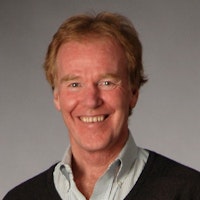Cultivation, ‘becoming a real human being,’ really is the primary leadership issue of our time, but on a scale never required before.
Peter M. Senge

Becoming a Real Human Being
Topic: Justice, Vision, & Leadership
That’s why I think that cultivation, ‘becoming a real human being,’ really is the primary leadership issue of our time, but on a scale never required before. It’s a very old idea that may actually hold the key to a new age of global democracy.
Peter Michael Senge was born in 1947 in Stanford, California, amidst an environment steeped in academic and innovative pursuits. Attending Stanford University, he majored in aerospace engineering and engaged with philosophy, blending technical skill with philosophical depth. His academic path continued at the Massachusetts Institute of Technology (MIT), earning a Master's in social systems modeling and a Ph.D. in Management. This educational blend set the stage for Senge's future influence on organizational learning and systems thinking.
In his seminal book, "The Fifth Discipline," Senge unfolds the concept of the learning organization, prioritizing systems thinking and continual organizational improvement. Recognized by the Harvard Business Review for its significant impact, the book challenges the reliance on singular leadership for change, advocating instead for a culture of collective learning and adaptability to overcome resistance to change.
Senge's dedication to personal growth is evident in his practice of Zen meditation and engagement with contemplative traditions since 1996, beginning with a retreat to Tassajara, a Zen Buddhist monastery. This commitment to mindfulness and awareness is central to his approach to understanding and leading within complex systems. Through integrating personal development with professional insight, Senge demonstrates the importance of inner clarity in fostering organizational excellence and adaptability.
Presence
Senge, Peter M., and Otto Scharmer. Presence: an Exploration of Profound Change in People, Organizations, and Society. Doubleday, 2005, p. 186.

Peter M. Senge
Theme: Servant Leadership

About This Peter M. Senge Quotation [Commentary]
In the words of Peter M. Senge, the journey toward true leadership begins with the process of “becoming a real human being.” Senge asserts that this concept of cultivation is critical for addressing the leadership challenges of our time. Unlike traditional views of leadership focused on acquiring skills or positions, Senge emphasizes self-awareness, intrinsic values, and humanity as the core elements. True leadership, according to Senge, transcends technical competencies and is rooted in the quality of one’s character and depth of understanding.
Senge’s emphasis on ‘cultivation’ aligns with the wisdom of Confucian thought, particularly as interpreted by Master Nan Huai Chin in “The Great Learning.” This connection underscores the importance of personal development and self-discovery in forming a leader. By advocating for leaders to embark on this journey, Senge highlights the necessity of empathy and moral integrity. It is through becoming “a real human being” that leaders can genuinely understand and meet the needs of others, leading with compassion and effectiveness.
Senge envisions a new age of global democracy where leadership is anchored in universal principles of humanity and service. This vision calls for a shift in our understanding of leadership, redefining it as serving the greater good rather than exerting control. Senge’s call to cultivate oneself to connect deeply with others transforms leadership into a shared human endeavor. In this context, servant leadership emerges as the highest form, capable of fostering change in individuals, organizations, and society. Senge’s vision is a guide for effective leadership and a call to awaken our shared human potential, leading with heart, integrity, and responsibility to our global community.
Restoring Human Wisdom
“The challenges we face can seem overwhelming. In fact, they are overwhelming us because we don’t appreciate the exquisite web of interconnectedness that enables life in the universe. Wherever we stand, we stand within a web. Human wisdom expressed in many deep-rooted and varied societal traditions around the world has long acknowledged that an understanding of systems in their totality is the only foundation for making sound choices that benefit the health of the whole.
I believe humans have innate capacities, beyond social conditioning, to develop a holistic awareness of their relationship with the world. Activating these capacities starts with seeing the connection between human consciousness and the physical world. This foundational concept is now reentering the mainstream of Western culture. Diverse new scientific theories are legitimating this ancient idea, ranging from the esoteric frontiers of quantum theory (where it is now widely accepted that measured quantum states do not exist independent of how we try to measure them) to systems theory, which continually reminds us that our perceptions of reality shape our actions and, consequently, that reality.
To impact society, this new understanding must penetrate business, education, government, and other core institutions. The professionals in these institutions must create more inclusive and integrated ways of living and working. Such change must encompass diverse global movements, whether holistic health, restorative justice, or learner-centered learning in schools. In business, it will mean recognizing, as interdependence grows, that there are more effective alternatives than managing with traditional hierarchical power. More and more businesses are striving for fewer layers of management and more “self-organization.” More and more are breaking free of mechanical notions of top-down control, starting to see organizations as living systems rather than, as Arie de Geus, author of The Living Company has said, machines for producing money. Again, older notions of self-organizing and self-governing exist throughout the world, in many native and indigenous cultures—wherever human beings have tried to understand nature deeply and to live in accord with its teachings.
When I have heard executives in global companies talk candidly about the future, their real concern usually is not the cost of capital or return on sales; it is the social and political stability of the world they will leave behind. They, too, see the future as an alien place. If it is to become more hospitable, we must rediscover and more effectively apply the human wisdom that is in our nature.”
―Peter Senge, Creating Positive Futures in an Interdependent World [Learning for Sustainability –Peter Senge, Joe Laur, Sara Schley, Bryan Smith].
Peter M. Senge, Presence: an Exploration of Profound Change in People, Organizations, and Society
Master Nan Huai Chin on Becoming a human being
“Master Nan then added that the core of the Confucian theory of leadership formation rests on the idea that ‘if you want to be a leader, you have to be ‘a real human being’. You must recognize the true meaning of life before you can become a great leader. You must understand yourself first.'”
―Peter M. Senge and Otto Scharmer [Presence: An Exploration of Profound Change in People, Organizations, and Society (The Great Learning, translation by Master Nan Huai Chin, Hong Kong)].
The relationship between Peter M. Senge and Master Nan Huai Chin illustrates a profound intersection of Eastern wisdom and Western leadership theory. Senge, a respected leadership expert and MIT professor who practices daily Buddhist meditation, recognized the value of Master Nan’s insights. As a Chan Buddhist master, Taoist master, and Confucian scholar, Master Nan brought a deep understanding of ancient wisdom to modern leadership challenges. Senge’s arrangement for his colleague Otto Scharmer to meet Master Nan in Hong Kong led to a significant exchange of ideas. Master Nan’s translation of “The Great Learning” and his emphasis on becoming “a real human being” as a prerequisite for leadership deeply resonated with Senge’s own philosophy. This connection underscores Senge’s belief that true leadership stems from self-understanding and personal cultivation, bridging millennia-old Eastern philosophies with contemporary Western leadership practices.
Resources
Related Quotes
Copyright © 2017 – 2025 LuminaryQuotes.com About Us